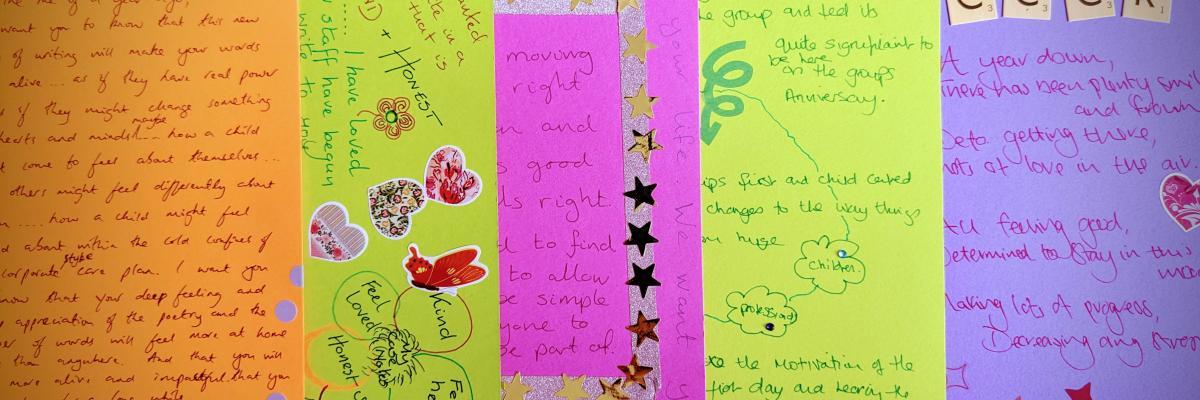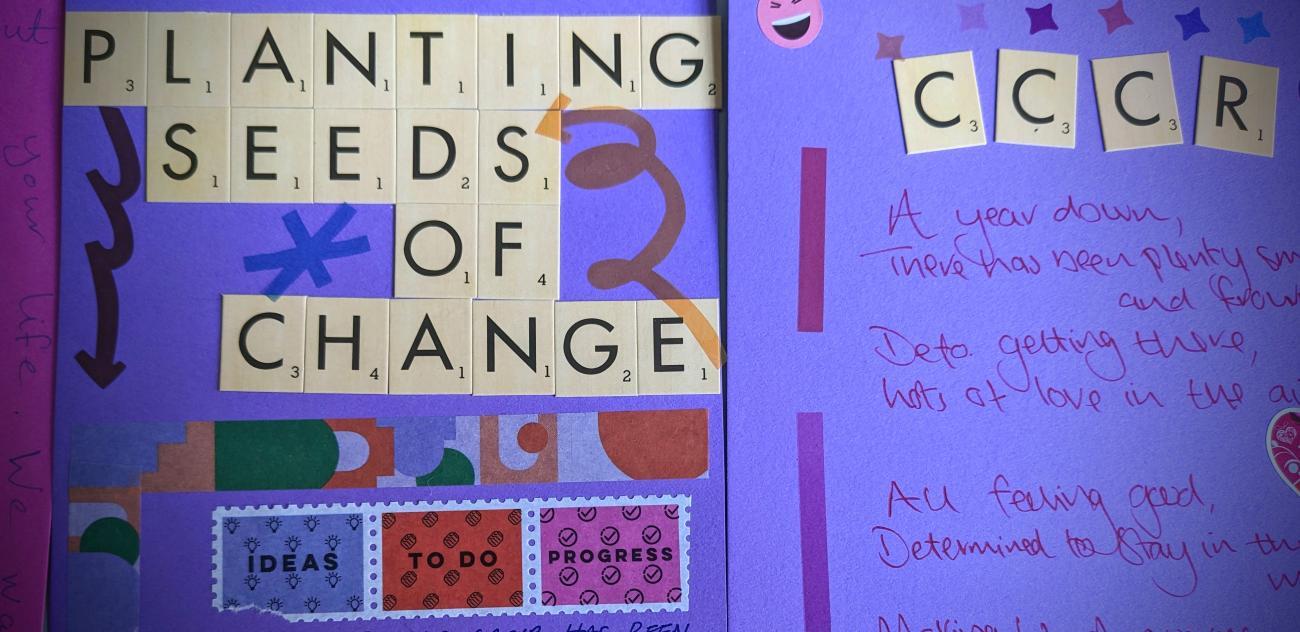For the last year we have been working with a group of passionate practitioners taking a fresh approach to making change. The Child Centred Case Recording (CCCR) group formed in 2022. They got together to support Falkirk’s children and families social work staff to write all case notes to their young people by 2027. It's our one-year anniversary of meeting as a group.
We wanted to share with you some of the successes and trials that we've had this year. It's a mixed group, including management and service leaders, but the key voices are practitioners working on the frontline. The work is directed by a group of young people, the Falkirk Young Champs. These young people told us that they need to see change in case recording, for their well-being and for the well-being of young people that come after them. The CCCR group have taken on this task with gusto and have told young people:
“We want you to feel seen, heard and loved in all that we write about you. We will write in a way that makes sense to you, that is kind and is honest. We will write in a way that will help you to understand why we were involved with you and your family.”
So, how are they going to make this happen?
The group is very focussed and driven, but sometimes the scale of the task can be overwhelming! By making consistent small changes, experimenting and learning on the job, we can now look back and see real change is happening.
The group's approach fits well with the ways that Iriss is interested in ‘doing’ innovation to embed dignity into the day-to-day of anyone using Scotlands’ social services. Rather than overhauling a system and starting from scratch, we are using a strengths-based approach that takes a ‘gardening’ style intervention. Planting seeds of change, tending to them, and creating the conditions for them to flourish. Through experimentation with tests of change, staff are changing their practice piece-by-piece and influencing the rest of their service.
We start small and learn, and by doing we inspire colleagues across the other services to make change too.
What progress has been made?
At the beginning of the project we had a five year plan set out, complete with a driver diagram, planned tests of change and a whole host of outcomes. We use this as inspiration rather than a route map. We realised that rather than trying to change systems to change practice, we actually ended up going the other way!
Some thoughts form the group on our process:
“We gave ourselves five years when we drew our first driver diagram. We thought we would have to change culture to create changes in practice. But this approach has showed us that actually, what we have done is on the other way round - made small changes to practise that are shifting the culture. Which is quite nice.
There have been lovely examples of people falling on your case notes, looking at them for different reasons, and then saying “oh I really like how you did those case notes”, so people are talking about it which is creating change.
So it's kind of filtering. We keep saying - you're not going to break the system, try something, give it a go, find out what the barriers are. I think that permission from senior managers has kind of meant that things have gone a bit faster than we intended.”
One of the thing we had to do was create culture change across systems that these notes are used in. This involved sharing our work across different settings to prepare people for change.
"Once we had tried some things out we did presentations to the central management group. Two social workers gave a presentation to the children and families management team. It was a grassroots approach where we said 'actually this is what we're finding, here's the challenges, this is how a case note might look different, this is how a plan might look different.' We got them on board so they understand. We have legal services represented in the group now who are talking to the rest of legal services and starting to think about how this kind of writing will work in a court setting.
There's been discussions with the children's panel. There's an agreement that there is going to be a small test of one case so that the panel can experience this type of paperwork. This represents quite a big hurdle because these are really long detailed reports with lots of information, not just about the child. So I think trying to re-frame that is going to be a challenge. But I have seen examples from an English local authority who have done it in this way so it is possible. When you read it you realise, Oh, actually, that's not that hard. It can be done!
We also briefed the Fostering and adoption panel chairs, again with a hope that one child's journey will go through that process. We also did a permanence plan for a child which will go to the panel, but the report was already developed and is very long. So we have decided to work on new documentation rather than redo things that already exist."
It hasn’t all been smooth though. The group acknowledges that real courage was required at the beginning of the process. They acknowledge that this will be a big step for every worker to adopt a new way of working.
“We've been thinking a lot about what the change asks of workers. We've done a lot of personal reflection on that over different sessions. We did early sessions about what all our worries were and why we wanted to do it, what the personal barriers were. One of the things that came up was that writing in this way brings a story a lot closer to home, and the proximity it brings to yourself. It makes it much more emotive.
Using 'I' more in our writing makes it much easier to be loving and caring. In my plans now I'm writing things like “I was so glad to hear that you started college and Im really looking forward to seeing you again.” which are details I probably would have missed before. So it really brings you and your feelings into it. That can be a challenge particularly when you're making more difficult decisions.
There is a protection about professional language that you can hide behind. So this process is changing our behaviour as well as the way we are writing. It's still possible to get things wrong or to not be child centred using this style of writing, it doesn't fix all the problems. But it does prompt you to think more and naturally include more analysis. If you are explaining your decisions to the child directly you have to explain why you have decided what you have.
Because it's a new way of writing, you can't use the same stock phrases that you're used to using. It does take more time initially because you're having to rethink how you explain regular events. But once you get more practice it starts to flow. Initially we did talk about making a kind of cutting paste glossary to support people to make this change. But we decided that actually all practitioners are different and need to find their own words to explain to young people what's happening in their lives. But we do think examples will help people make the change."
Where are we now?
We have lots of ideas going forward about what we want to do next. For example, we want to support Foster carers to start writing to the child when they are doing young people's Diaries. We need to keep young people involved in the direction of the project. One of our next steps is to go back to the Young Champions Group who initiated this change. It will be great to hear about what they think about the progress we've made.
“In the leaving care team, young people are very actively involved in writing their reports, so they are seeing them. They are young adults. They certainly have said that they like this way of writing better. Professionals have said "oh yeah this is great this we like it’. It will be a long time before we truly see the impact of this work because when it will really impact People is when they revisit the notes as adults.”
I have been so inspired by the practitioners I've been working with. They're able to keep paddling even when it feels like they're going upstream. Their consistent positivity, leadership and sense of humour, along with their humility and willingness to try things, has meant that they have made change that we didn't think would be possible at the beginning of the year. Here are some of their own words about the progress of the project.
To me of a year ago,
I want you to know that this new way of writing will make your words feel alive. as if they have real power, as if they might change something...hearts and minds maybe. They might change how a child might come to feel about themselves, how others might feel differently about them, how a child might feel cared for within the cold confines of a care plan. I want you to know that your a deep feeling and deep appreciation of the poetry and the power of words will feel more at home here than anywhere. And that you will feel more alive and impactful that you have then you have done for a long while.
A year down,
There has been plenty smiles and frowns,
Defo getting there,
Lots of love in the air.
All feeling good.
Determined to stay in this mood.
Making lots of progress,
Decreasing any stress.


